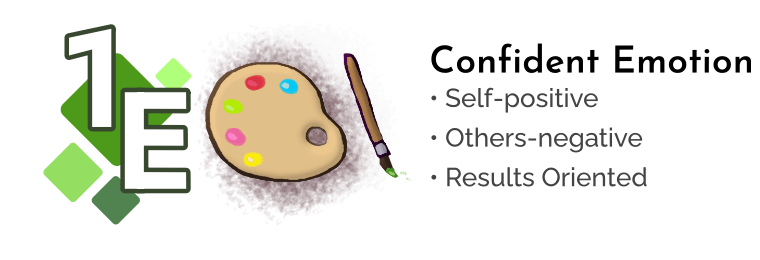
The 1E attitude is characterized by a self-positive (Es+), others-negative (Eo-) disposition. This disposition creates an attitude that is acutely aware of its own strengths within the realm of emotion. 1Es understand their own power within this aspect and generally want to protect it at all costs. All incoming emotional information from others must be pushed through the 1E’s subjective interpretation before it is accepted. The strategies that each 1E employs may differ in behavior or execution but the core attitude of subjective protection over what they believe is their greatest asset will be consistent and true for all 1Es. Below are some common beliefs and behaviors that you may see with 1Es. Please keep in mind that these are generalities and do not represent the vast sub-archetypes held within the overall 1E attitude.
Dichotomies
Certain • Sufficient • Strong • Aggressive • Subjective • Vulnerable • Flippant • Local • Distinct
Attitudinal Beliefs
• Believes that they have the right to express themselves or refuse to do so whenever they wish.
• Trusts that they can form all necessary judgments about relationships and people.
• Deems their own emotions as paramount to all other parts of reality.
• Believes that their intuition about others predicates their feelings towards them.
• Believes that it is their right to value people over others without explanation.
• Expects that others accept their emotional expressions whether they like it or not.
• Imagines that others can feel their mood without having to explain it too much.
• Feels that emotions are the essence of their being.
• Assumes that there is always an emotional reason for all of their actions in the world.
• Expects that others take relational advice without questioning it too much.
• Believes that they do not owe anyone any explanations of why they feel a certain way.
• Knows that only they themselves can truly understand the depth of their own emotional world.
• Presumes that they can read the emotional tone of the room better than anyone else.
• Feels that their own associations between people and experiences are supreme perceptions.
• Believes that they can dole out advice about people whenever they please without retribution.
• Credits themselves for any intuitive or imaginative creations that they develop.
• Expects that others respect their current emotional obsession, be it art, music, or a relationship.
• Knows that life is only worth living if it can be felt.
• Feels that all experiences must lead back to the ever-present internal emotional current.
• Believes it is their right to reject others’ demands of emotional appropriateness.